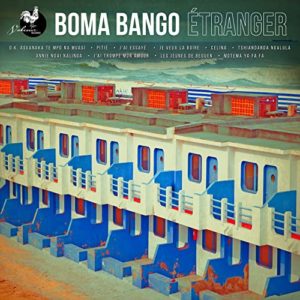 It’s not hard to imagine an only slightly alternate world in which a brand of rumba took root and flourished in the heart of Acadiana, just as it did in Africa in the heart of the Congo. Both places have Francophone colonial histories and inextricable ties to Caribbean cultures rooted in generations of the slave trade and migration from Africa.
It’s not hard to imagine an only slightly alternate world in which a brand of rumba took root and flourished in the heart of Acadiana, just as it did in Africa in the heart of the Congo. Both places have Francophone colonial histories and inextricable ties to Caribbean cultures rooted in generations of the slave trade and migration from Africa.
Lafayette-based Boma Bango imagines this premise, with loping Congolese rumbas, frisky merengues, lilting beguines and frisky soukous variations given a (slight) Cajun accent. Emphasis should be placed on slight—this is not some sort of Tabu Ley Rochereau-meets-Iry LeJeune hybrid or anything. You won’t hear any fiddles or accordions, or even a triangle, mixed in with the guitars, bass, drums and sax. That could have easily descended into novelty territory. This is anything but. Though the album is titled Étranger, the loving and spirited tribute to sounds from halfway around the globe doesn’t seem all that strange or foreign.
Boma Bango came about a few years ago when guitarist Daniel Coolik of The Revelers, passionate for classic Congolese music, enlisted two fellow bandmates, bassist Trey Boudreaux and drummer Glenn Fields, plus singer Megan Constantin (of Cajun trio T’Monde) and conga and marimba player Bill Smith, to give the material a try. The songs on this debut draw largely from the repertoire of the foundational OK Jazz (later renamed TPOK Jazz), an ensemble that performed for decades beginning in the 1950s in what was then known as Belgian Congo. Inspired by imported Afro-Caribbean records from the 1930s and ’40s, the group produced dozens of Congolese stars, starting with cofounders Victor “Vicky” Longomba and Franco. They spawned a lively scene that sprouted Docteur Nico, Tabu Ley, Verckys Kiamuangana and M’bilia Bel, among many other titans.
The interlocking rhythms of the album’s opening cha-cha “O.K. Asuanaka Te Mpo Na Muasi,” a mid-1960s song by Michel Boybanda and OK Jazz, set the tone, with New Orleans’ Aurora Nealand adding skittering sax, as she does on several tracks. While the original is sung in the Lingala language of Central Africa, Boma Bango does it and several others on the album as instrumentals, perhaps wisely.
But much Congolese music is, of course, sung in French, and Constantin steps in on several classics, which is where the Cajun accent comes in. On the lament “Pitié,” an early 1970s hit by Rochereau, she adapts his mellifluous yearning into a Cajun ballad style that would be at home on a slow fiddle-and-accordion waltz. The style works perfectly with Boma Bango’s deliberate, tropical trot. On “J’ai Trompé Mon Amour” (“I Cheated On My Love”), written and originally sung by OK Jazz’s Longomba, she turns torchy.
Most remarkable in some ways are two Coolik/Constantin originals—the somber “J’ai Essayé” (“I Tried”) and the sparkling call-and-response “Je Veux La Boire” (“I Want to Drink It Up”). If you didn’t read the credits or weren’t able to discern that the lyrics are in the Louisiana French dialect, you might assume that they, too, were from African sources.
Étranger, by the way, marks the 50th release from Valcour Records, the Acadiana label run by Joel Savoy of the famed Savoy family. Valcour has been a home for both very traditional sets and some forays afield into country, honky tonk and rock, but the label generally stays relatively close to home. Geographically this may be a stretch, but close your eyes while listening and picture the folks at Fred’s Lounge shimmying around the dance floor to this, the tropical humidity condensing on the Abita bottles in their hands.




